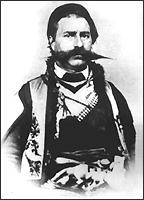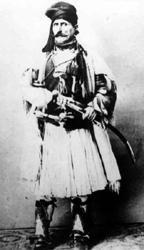The emergence of guerilla detachments and the guerilla movement in Bulgaria at the middle of the 19th century marked the beginning of a new and higher stage in the Bulgarians’ fights for national liberation from 5 centuries of Turkish rule. Unlike the rebel fighters who were more of a local phenomenon, driven by personal irreconcilability with the Ottoman domination, the guerilla movement was straightforward and well-organised and harbinger of the idea of a large-scale liberation struggle. More on the subject from historian Nikolay Poppetrov.
The guerilla movement was formed after the Crimean War of 1853-56 when the Bulgarian emigrant communities in the Romanian and Serb lands recognized the necessity of an extensive resolution to the question of Bulgaria’s liberation. From a more narrow perspective, the idea of organised struggle was conceptualised by revolutionist Georgi Rakovski. In his plan, guerrilla detachments were the main instruments for igniting a mass and successful uprising on the way to liberation. The actions of the detachments also had the purpose of showing the European community the strife of the Bulgarian nation towards political independence.
The detachments used to recruit their members mainly among the Bulgarian emigrants in the neighbouring Balkan countries. This is how a core of professional revolutionaries was formed who had good physical abilities, mastery in weapon handling and were part of an hierarchy. The detachment was led by a chieftain or voivode together with his assistant and a colour-bearer. The detachment colours had a small lion on them and a motto “Freedom or Death”. They had huge emblematic meaning as a slogan of Bulgaria’s clear national identity. The uniform was a sign of the existence of Bulgaria’s own armed forces. The psychological influence these emblems would exercise on the enslaved population was of extreme importance, as well as one of the most significant effects of the guerilla movement. In addition to that, their systematic organisation abroad and their activity within the limits of Bulgaria were of huge importance for the quick building of Bulgarian liberation strategy and tactics.

The guerilla movement reached its peak in 1867-68 with the raids of Filip Totju, Panayot Hitov and the detachment led by Hadji Dimitar and Stefan Karadja, all very important figures in the history of Bulgaria’s liberation. Still, the results of their activity were quite limited and the victims numerous. The stories of their courage however resounded all over Europe and forced the Ottoman authorities to manoeuvre and moderate their rule in the Bulgarian lands. What was of greater significance however, was the effect this movement had on the following activity of the Bulgarian revolutionary circles. The Bulgarian revolutionist emigrants started seeking new ways to liberation. Vassil Levski, the ideologist and organiser of the Bulgarian national liberation movement, after his participation as colours-bearer in one of the Bulgarian detachments, undertook the formation of an orderly

and purposeful organisation. This is how the Bulgarian nation got to its most massive armed action against the Ottoman rule, the April Uprising of 1876.
In the course of the uprising, the guerrilla detachments emerged again with the task of adding scale to the rebellion. The culmination in the struggles for national liberation came with the action of poet and chieftain Hristo Botev who came from Romania with a detachment of 200 to aid his brothers in their fight. This episode of Bulgaria’s history has turned into a national legend. The example set by the guerilla movement lies at the basis of the psychological commitment with which thousands of Bulgarians gathered in the lines of the Bulgarian volunteer forces who made a great difference in the Russo-Turkish war of 1877-78 which resulted in Bulgaria’s liberation.
For the Orthodox Church, the 29th of April marks the beginning of Holy Week - a profound period dedicated to the contemplation of the life of the Saviour and the preparation for the Holy Resurrection. Immediately after the great Christian feast of..
"Blessed is the King who comes in the name of the Lord! Peace in heaven and glory in the highest!" (Luke 19:38). With these enthusiastic exclamations, which the Church recalls on the feast of the Entry of the Lord into Jerusalem, Jesus Christ was..
The tangents between biology and ecclesiastical icon-painting are unknown and incomprehensible to those who are devoted to science. For Ekaterina Titova, a doctor of biological sciences accustomed to approaching everything through logic, religious..
For the Orthodox Church, the 29th of April marks the beginning of Holy Week - a profound period dedicated to the contemplation of the life of the Saviour..

+359 2 9336 661
